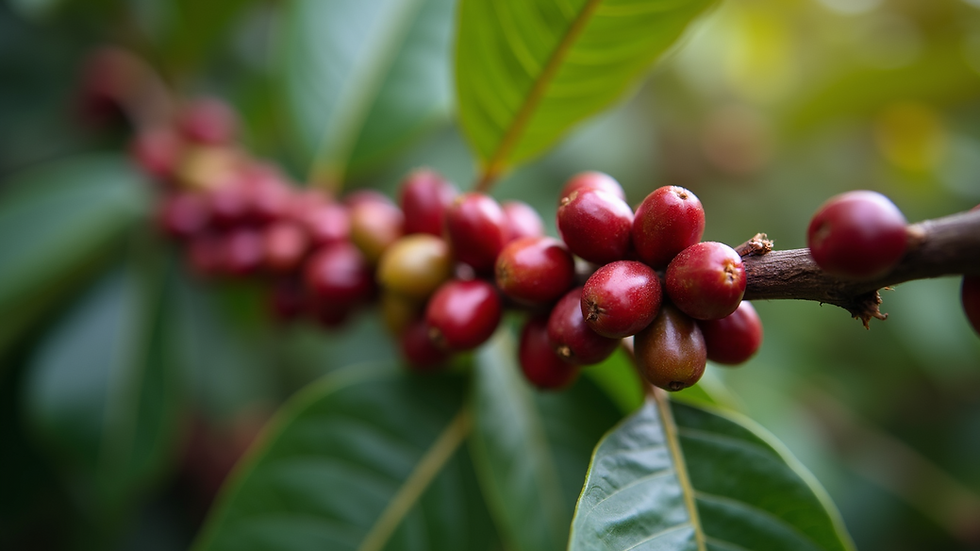Fair Trade Organic Coffee Beans: Ethical and Delicious
- Jeff Pempeit

- Oct 27, 2025
- 4 min read
Coffee is more than just a morning ritual or a comforting beverage. It is a global commodity that connects millions of people, from farmers in remote regions to consumers worldwide. However, the journey from coffee bean to cup is often fraught with challenges, including unfair labor practices, environmental degradation, and inconsistent quality. This is where ethical coffee sourcing plays a crucial role. By choosing coffee that is both fair trade and organic, consumers can support sustainable farming, empower communities, and enjoy a richer, more flavorful cup of coffee.
Understanding Ethical Coffee Sourcing
Ethical coffee sourcing means selecting coffee that is produced with respect for people and the planet. It involves ensuring fair wages and safe working conditions for farmers, promoting environmentally friendly farming methods, and fostering transparency throughout the supply chain. Ethical sourcing is not just a trend but a commitment to making coffee production more sustainable and equitable.
One of the key components of ethical coffee sourcing is the certification of coffee beans. Certifications like Fair Trade and Organic provide guarantees that the coffee meets specific social and environmental standards. Fair Trade certification ensures that farmers receive fair prices and work under decent conditions, while Organic certification guarantees that the coffee is grown without synthetic pesticides or fertilizers, protecting both the environment and consumer health.

The Benefits of Fair Trade and Organic Coffee
Choosing coffee that is both fair trade and organic offers multiple benefits that extend beyond the cup. Here are some of the most significant advantages:
Empowering Farmers and Communities: Fair trade premiums provide farmers with additional income that can be invested in education, healthcare, and infrastructure. This helps build stronger, more resilient communities.
Protecting the Environment: Organic farming practices avoid harmful chemicals, reduce soil erosion, and promote biodiversity. This leads to healthier ecosystems and cleaner water sources.
Superior Coffee Quality: Organic coffee is often grown at higher altitudes and harvested with care, resulting in beans with richer flavors and aromas.
Consumer Health: Organic coffee is free from synthetic pesticides and herbicides, reducing exposure to harmful chemicals.
Market Stability: Fair trade agreements provide farmers with stable prices, protecting them from volatile market fluctuations.
By supporting ethical coffee sourcing, consumers contribute to a more just and sustainable coffee industry.
How to Identify and Choose Ethical Coffee
Finding truly ethical coffee can be challenging due to the many labels and certifications on the market. Here are practical tips to help you make informed choices:
Look for Certified Labels: Check for Fair Trade and Organic certifications on packaging. These labels are issued by reputable organizations that audit farms and cooperatives.
Research the Brand: Choose brands that are transparent about their sourcing practices and have a clear commitment to sustainability.
Buy from Specialty Coffee Shops: These shops often source directly from farmers or cooperatives and can provide detailed information about the coffee’s origin.
Consider Single-Origin Coffee: Single-origin coffees come from a specific region or farm, allowing for better traceability and quality control.
Support Local Roasters: Local roasters often have closer relationships with coffee producers and can offer fresher, ethically sourced beans.
By following these steps, you can enjoy coffee that aligns with your values and tastes.

Brewing Tips for the Perfect Cup
Once you have selected your ethically sourced coffee, brewing it properly is essential to unlock its full potential. Here are some actionable recommendations:
Use Fresh Beans: Grind your coffee just before brewing to preserve flavor and aroma.
Measure Accurately: Use a kitchen scale to measure coffee and water for consistent results.
Choose the Right Grind Size: Adjust grind size based on your brewing method (coarse for French press, medium for drip, fine for espresso).
Use Clean, Filtered Water: Water quality significantly affects taste.
Control Water Temperature: Aim for 195-205°F (90-96°C) to extract optimal flavors.
Experiment with Brew Time: Adjust brewing time to balance strength and bitterness.
These simple steps can elevate your coffee experience and highlight the unique characteristics of fair trade organic coffee beans.
Supporting a Sustainable Coffee Future
The coffee industry faces numerous challenges, including climate change, deforestation, and economic instability for farmers. Supporting ethical coffee sourcing is a powerful way to address these issues. By choosing Fair trade organic coffee beans, consumers help promote sustainable agriculture, protect natural habitats, and improve the livelihoods of coffee-growing communities.
Moreover, ethical coffee sourcing encourages innovation in farming techniques, such as agroforestry and water conservation, which are vital for adapting to changing environmental conditions. It also fosters a culture of respect and fairness that benefits everyone involved in the coffee supply chain.
As demand for ethical coffee grows, more farmers and companies are motivated to adopt responsible practices, creating a positive cycle of improvement and awareness.
Making Ethical Coffee a Part of Your Lifestyle
Incorporating ethical coffee into your daily routine is easier than you might think. Here are some practical ways to get started:
Subscribe to Ethical Coffee Services: Many companies offer subscription plans that deliver certified coffee to your door regularly.
Educate Yourself and Others: Share information about ethical coffee sourcing with friends and family to raise awareness.
Support Coffee Events and Tastings: Attend local or virtual events focused on sustainable coffee to learn more and connect with like-minded people.
Reduce Waste: Use reusable coffee filters, cups, and storage containers to minimize environmental impact.
Advocate for Change: Encourage cafes and retailers to stock ethical coffee options.
By making conscious choices, you contribute to a more sustainable and ethical coffee culture.
Enjoying coffee that is both delicious and ethically sourced is a rewarding experience. It connects you to the people and places behind every cup and supports a healthier planet. Next time you shop for coffee, consider the impact of your choice and opt for Fair trade organic coffee beans to make a difference with every sip.





Comments